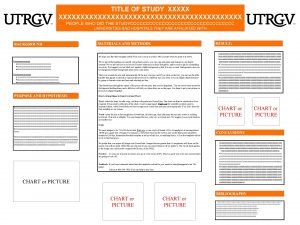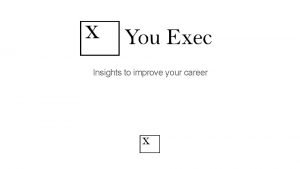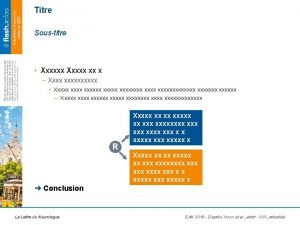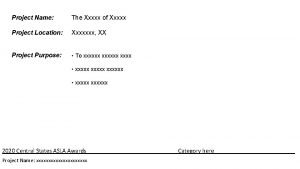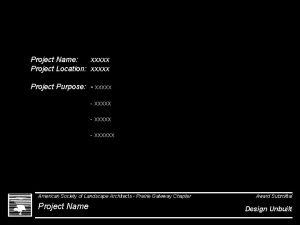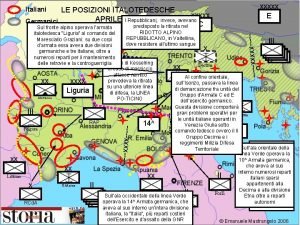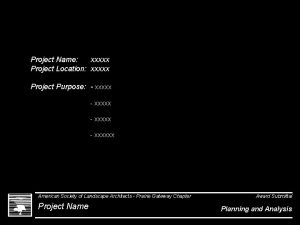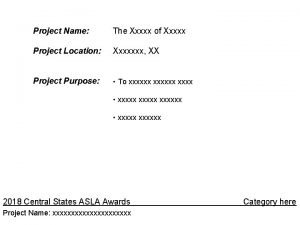Commonly used logos Department of xxxxx College of






- Slides: 6

Commonly used logos

Department of xxxxx, College of xxxxxx, University of Illinois at Urbana- Champaign Presenter name, Associates and Collaborators Template for a 48” by 36” poster Introduction Method Results This editable template is in the most common poster size (48” x 36”) and orientation (horizontal); check with the conference organizers for specific conference requirements regarding exact poster dimensions. Writing Style: The writing style for scientific posters should match the guidelines for your particular research discipline. Use the campus Writing Style Guide for general guidance with academic titles, names of campus buildings, the correct way to refer to the campus, etc. Campus Guidelines Authors should be aware of and follow the guidelines of the Institutional Review Board and the guidelines for campus copyright. Text Be sure to spell check all text and have trusted colleagues proofread the poster. In general, authors should: • Use the active tense • Simplify text by using bullet points • Use colored graphs and charts • Use bold to provide emphasis; avoid capitals and underlining • Avoid long numerical tables Authors should re-write their paper so that it is suitable for the brevity of the poster format. Respect your audience–as a general rule, less is more. Use a generous amount of white space to separate elements and avoid data overkill. Refer to Web sites or other sources to provide a more in-depth understanding of the research. Images TIFFs are the preferred file format for images appearing in printed posters. Avoid the use of low -resolution jpgs, especially those downloaded from the Internet, as they will reproduce poorly. In order to insert an image, use the menu toolbar at the top of your screen. Aim How to use this template Highlight this text and replace it with new text from a Microsoft Word document or other text-editing program. The text size for body copy and headings and the typeface has been set for you. If you choose to change typefaces, use common ones such as Times, Arial, or Helvetica and keep the body text between 26 and 32 points. Select: 1 Insert 2 Picture 3 From file 4 Find and select the correct file on your computer 5 Press OK Be aware of the image size you are importing. Captions set in a serif style font such as Times, 18 to 24 size, italic style. Duis autem vel eum iriure dolor in hendrerit in vulputate velit esse molestie consequat. Captions set in a serif style font such as Times, 18 to 24 size, italic style. Duis autem vel eum iriure dolor in hendrerit in vulputate velit esse molestie consequat. The text boxes and photo boxes may be resized, eliminated, or added as necessary. The references to the department, college and university, including the logo, should remain. Refer to the last page for logos commonly used on campus posters. You can drag and drop them to your personal Power. Point scrapbook for use in subsequent posters; refer to Power. Point help documents for more specific information regarding how to use the scrapbook Printing and Laminating Facilities & Services Printing Department will print and laminate posters in the dimensions of this template and provide a mailing tube for transportation at these prices: $60. 00 printing $18. 00 lamination $5. 00 proof (12. 6" x 16. 8”) $3. 50 mailing tube To place your order, contact the Printing Department at 217 -333 -9350 or send an e-mail. Please refer to estimate #005238 when submitting your order. Plan ahead; allow three business days for the Printing Department to complete the order. Other dimensions are available; the charge is by square foot. Contact the Printing Department for pricing information. Resolving Printing Problems Power. Point does not always create the best Post. Script files for printing. If you choose to have these printed on a campus plotter or by a thirdparty vendor and have printing errors, you may wish to export the file as a PDF and resend the file to the printing server/plotter. Conclusions We have created this template with scientific researchers in mind and with the help of feedback we have received. We encourage any comments or suggestions so that we can continue to update and improve this template. Visit this page to make a suggestion. Acknowledgments Check to make sure you’ve acknowledged partner and funding agencies, either with text or with their logos. Captions set in a serif style font such as Times, 18 to 24 size, italic style. Duis autem vel eum iriure dolor in hendrerit in vulputate velit esse molestie consequat.

Department of xxxxx, College of xxxxxx, University of Illinois at Urbana- Champaign Presenter name, Associates and Collaborators Template for a 48” by 36” poster Introduction Method Results This editable template is in the most common poster size (48” x 36”) and orientation (horizontal); check with the conference organizers for specific conference requirements regarding exact poster dimensions. Writing Style: The writing style for scientific posters should match the guidelines for your particular research discipline. Use the campus Writing Style Guide for general guidance with academic titles, names of campus buildings, the correct way to refer to the campus, etc. Campus Guidelines Authors should be aware of and follow the guidelines of the Institutional Review Board and the guidelines for campus copyright. Text Be sure to spell check all text and have trusted colleagues proofread the poster. In general, authors should: • Use the active tense • Simplify text by using bullet points • Use colored graphs and charts • Use bold to provide emphasis; avoid capitals and underlining • Avoid long numerical tables Authors should re-write their paper so that it is suitable for the brevity of the poster format. Respect your audience–as a general rule, less is more. Use a generous amount of white space to separate elements and avoid data overkill. Refer to Web sites or other sources to provide a more in-depth understanding of the research. Images TIFFs are the preferred file format for images appearing in printed posters. Avoid the use of low -resolution jpgs, especially those downloaded from the Internet, as they will reproduce poorly. In order to insert an image, use the menu toolbar at the top of your screen. Aim How to use this template Highlight this text and replace it with new text from a Microsoft Word document or other text-editing program. The text size for body copy and headings and the typeface has been set for you. If you choose to change typefaces, use common ones such as Times, Arial, or Helvetica and keep the body text between 26 and 32 points. Select: 1 Insert 2 Picture 3 From file 4 Find and select the correct file on your computer 5 Press OK Be aware of the image size you are importing. Captions set in a serif style font such as Times, 18 to 24 size, italic style. Duis autem vel eum iriure dolor in hendrerit in vulputate velit esse molestie consequat. Captions set in a serif style font such as Times, 18 to 24 size, italic style. Duis autem vel eum iriure dolor in hendrerit in vulputate velit esse molestie consequat. The text boxes and photo boxes may be resized, eliminated, or added as necessary. The references to the department, college and university, including the logo, should remain. Refer to the last page for logos commonly used on campus posters. You can drag and drop them to your personal Power. Point scrapbook for use in subsequent posters; refer to Power. Point help documents for more specific information regarding how to use the scrapbook Printing and Laminating Facilities & Services Printing Department will print and laminate posters in the dimensions of this template and provide a mailing tube for transportation at these prices: $60. 00 printing $18. 00 lamination $5. 00 proof (12. 6" x 16. 8”) $3. 50 mailing tube To place your order, contact the Printing Department at 217 -333 -9350 or send an e-mail. Please refer to estimate #005238 when submitting your order. Plan ahead; allow three business days for the Printing Department to complete the order. Other dimensions are available; the charge is by square foot. Contact the Printing Department for pricing information. Resolving Printing Problems Power. Point does not always create the best Post. Script files for printing. If you choose to have these printed on a campus plotter or by a thirdparty vendor and have printing errors, you may wish to export the file as a PDF and resend the file to the printing server/plotter. Conclusions We have created this template with scientific researchers in mind and with the help of feedback we have received. We encourage any comments or suggestions so that we can continue to update and improve this template. Visit this page to make a suggestion. Acknowledgments Check to make sure you’ve acknowledged partner and funding agencies, either with text or with their logos. Captions set in a serif style font such as Times, 18 to 24 size, italic style. Duis autem vel eum iriure dolor in hendrerit in vulputate velit esse molestie consequat.

Department of xxxxx, College of xxxxxx, University of Illinois at Urbana- Champaign Presenter name, Associates and Collaborators Template for a 48” by 36” poster Introduction Method Results This editable template is in the most common poster size (48” x 36”) and orientation (horizontal); check with the conference organizers for specific conference requirements regarding exact poster dimensions. Writing Style: The writing style for scientific posters should match the guidelines for your particular research discipline. Use the campus Writing Style Guide for general guidance with academic titles, names of campus buildings, the correct way to refer to the campus, etc. Campus Guidelines Authors should be aware of and follow the guidelines of the Institutional Review Board and the guidelines for campus copyright. Text Be sure to spell check all text and have trusted colleagues proofread the poster. In general, authors should: • Use the active tense • Simplify text by using bullet points • Use colored graphs and charts • Use bold to provide emphasis; avoid capitals and underlining • Avoid long numerical tables Authors should re-write their paper so that it is suitable for the brevity of the poster format. Respect your audience–as a general rule, less is more. Use a generous amount of white space to separate elements and avoid data overkill. Refer to Web sites or other sources to provide a more in-depth understanding of the research. Images TIFFs are the preferred file format for images appearing in printed posters. Avoid the use of low -resolution jpgs, especially those downloaded from the Internet, as they will reproduce poorly. In order to insert an image, use the menu toolbar at the top of your screen. Aim How to use this template Highlight this text and replace it with new text from a Microsoft Word document or other text-editing program. The text size for body copy and headings and the typeface has been set for you. If you choose to change typefaces, use common ones such as Times, Arial, or Helvetica and keep the body text between 26 and 32 points. Select: 1 Insert 2 Picture 3 From file 4 Find and select the correct file on your computer 5 Press OK Be aware of the image size you are importing. Captions set in a serif style font such as Times, 18 to 24 size, italic style. Duis autem vel eum iriure dolor in hendrerit in vulputate velit esse molestie consequat. Captions set in a serif style font such as Times, 18 to 24 size, italic style. Duis autem vel eum iriure dolor in hendrerit in vulputate velit esse molestie consequat. The text boxes and photo boxes may be resized, eliminated, or added as necessary. The references to the department, college and university, including the logo, should remain. Refer to the last page for logos commonly used on campus posters. You can drag and drop them to your personal Power. Point scrapbook for use in subsequent posters; refer to Power. Point help documents for more specific information regarding how to use the scrapbook Printing and Laminating Facilities & Services Printing Department will print and laminate posters in the dimensions of this template and provide a mailing tube for transportation at these prices: $60. 00 printing $18. 00 lamination $5. 00 proof (12. 6" x 16. 8”) $3. 50 mailing tube To place your order, contact the Printing Department at 217 -333 -9350 or send an e-mail. Please refer to estimate #005238 when submitting your order. Plan ahead; allow three business days for the Printing Department to complete the order. Other dimensions are available; the charge is by square foot. Contact the Printing Department for pricing information. Resolving Printing Problems Power. Point does not always create the best Post. Script files for printing. If you choose to have these printed on a campus plotter or by a thirdparty vendor and have printing errors, you may wish to export the file as a PDF and resend the file to the printing server/plotter. Conclusions We have created this template with scientific researchers in mind and with the help of feedback we have received. We encourage any comments or suggestions so that we can continue to update and improve this template. Visit this page to make a suggestion. Acknowledgments Check to make sure you’ve acknowledged partner and funding agencies, either with text or with their logos. Captions set in a serif style font such as Times, 18 to 24 size, italic style. Duis autem vel eum iriure dolor in hendrerit in vulputate velit esse molestie consequat.

Department of xxxxx, College of xxxxxx, University of Illinois at Urbana- Champaign Presenter name, Associates and Collaborators Template for a 48” by 36” poster Introduction Method Results This editable template is in the most common poster size (48” x 36”) and orientation (horizontal); check with the conference organizers for specific conference requirements regarding exact poster dimensions. Writing Style: The writing style for scientific posters should match the guidelines for your particular research discipline. Use the campus Writing Style Guide for general guidance with academic titles, names of campus buildings, the correct way to refer to the campus, etc. Campus Guidelines Authors should be aware of and follow the guidelines of the Institutional Review Board and the guidelines for campus copyright. Text Be sure to spell check all text and have trusted colleagues proofread the poster. In general, authors should: • Use the active tense • Simplify text by using bullet points • Use colored graphs and charts • Use bold to provide emphasis; avoid capitals and underlining • Avoid long numerical tables Authors should re-write their paper so that it is suitable for the brevity of the poster format. Respect your audience–as a general rule, less is more. Use a generous amount of white space to separate elements and avoid data overkill. Refer to Web sites or other sources to provide a more in-depth understanding of the research. Images TIFFs are the preferred file format for images appearing in printed posters. Avoid the use of low -resolution jpgs, especially those downloaded from the Internet, as they will reproduce poorly. In order to insert an image, use the menu toolbar at the top of your screen. Aim How to use this template Highlight this text and replace it with new text from a Microsoft Word document or other text-editing program. The text size for body copy and headings and the typeface has been set for you. If you choose to change typefaces, use common ones such as Times, Arial, or Helvetica and keep the body text between 26 and 32 points. Select: 1 Insert 2 Picture 3 From file 4 Find and select the correct file on your computer 5 Press OK Be aware of the image size you are importing. Captions set in a serif style font such as Times, 18 to 24 size, italic style. Duis autem vel eum iriure dolor in hendrerit in vulputate velit esse molestie consequat. Captions set in a serif style font such as Times, 18 to 24 size, italic style. Duis autem vel eum iriure dolor in hendrerit in vulputate velit esse molestie consequat. The text boxes and photo boxes may be resized, eliminated, or added as necessary. The references to the department, college and university, including the logo, should remain. Refer to the last page for logos commonly used on campus posters. You can drag and drop them to your personal Power. Point scrapbook for use in subsequent posters; refer to Power. Point help documents for more specific information regarding how to use the scrapbook Printing and Laminating Facilities & Services Printing Department will print and laminate posters in the dimensions of this template and provide a mailing tube for transportation at these prices: $60. 00 printing $18. 00 lamination $5. 00 proof (12. 6" x 16. 8”) $3. 50 mailing tube To place your order, contact the Printing Department at 217 -333 -9350 or send an e-mail. Please refer to estimate #005238 when submitting your order. Plan ahead; allow three business days for the Printing Department to complete the order. Other dimensions are available; the charge is by square foot. Contact the Printing Department for pricing information. Resolving Printing Problems Power. Point does not always create the best Post. Script files for printing. If you choose to have these printed on a campus plotter or by a thirdparty vendor and have printing errors, you may wish to export the file as a PDF and resend the file to the printing server/plotter. Conclusions We have created this template with scientific researchers in mind and with the help of feedback we have received. We encourage any comments or suggestions so that we can continue to update and improve this template. Visit this page to make a suggestion. Acknowledgments Check to make sure you’ve acknowledged partner and funding agencies, either with text or with their logos. Captions set in a serif style font such as Times, 18 to 24 size, italic style. Duis autem vel eum iriure dolor in hendrerit in vulputate velit esse molestie consequat.

Department of xxxxx, College of xxxxxx, University of Illinois at Urbana- Champaign Presenter name, Associates and Collaborators Template for a 48” by 36” poster Introduction Method Results This editable template is in the most common poster size (48” x 36”) and orientation (horizontal); check with the conference organizers for specific conference requirements regarding exact poster dimensions. Writing Style: The writing style for scientific posters should match the guidelines for your particular research discipline. Use the campus Writing Style Guide for general guidance with academic titles, names of campus buildings, the correct way to refer to the campus, etc. Campus Guidelines Authors should be aware of and follow the guidelines of the Institutional Review Board and the guidelines for campus copyright. Text Be sure to spell check all text and have trusted colleagues proofread the poster. In general, authors should: • Use the active tense • Simplify text by using bullet points • Use colored graphs and charts • Use bold to provide emphasis; avoid capitals and underlining • Avoid long numerical tables Authors should re-write their paper so that it is suitable for the brevity of the poster format. Respect your audience–as a general rule, less is more. Use a generous amount of white space to separate elements and avoid data overkill. Refer to Web sites or other sources to provide a more in-depth understanding of the research. Images TIFFs are the preferred file format for images appearing in printed posters. Avoid the use of low -resolution jpgs, especially those downloaded from the Internet, as they will reproduce poorly. In order to insert an image, use the menu toolbar at the top of your screen. Aim How to use this template Highlight this text and replace it with new text from a Microsoft Word document or other text-editing program. The text size for body copy and headings and the typeface has been set for you. If you choose to change typefaces, use common ones such as Times, Arial, or Helvetica and keep the body text between 26 and 32 points. Select: 1 Insert 2 Picture 3 From file 4 Find and select the correct file on your computer 5 Press OK Be aware of the image size you are importing. Captions set in a serif style font such as Times, 18 to 24 size, italic style. Duis autem vel eum iriure dolor in hendrerit in vulputate velit esse molestie consequat. Captions set in a serif style font such as Times, 18 to 24 size, italic style. Duis autem vel eum iriure dolor in hendrerit in vulputate velit esse molestie consequat. The text boxes and photo boxes may be resized, eliminated, or added as necessary. The references to the department, college and university, including the logo, should remain. Refer to the last page for logos commonly used on campus posters. You can drag and drop them to your personal Power. Point scrapbook for use in subsequent posters; refer to Power. Point help documents for more specific information regarding how to use the scrapbook Printing and Laminating Facilities & Services Printing Department will print and laminate posters in the dimensions of this template and provide a mailing tube for transportation at these prices: $60. 00 printing $18. 00 lamination $5. 00 proof (12. 6" x 16. 8”) $3. 50 mailing tube To place your order, contact the Printing Department at 217 -333 -9350 or send an e-mail. Please refer to estimate #005238 when submitting your order. Plan ahead; allow three business days for the Printing Department to complete the order. Other dimensions are available; the charge is by square foot. Contact the Printing Department for pricing information. Resolving Printing Problems Power. Point does not always create the best Post. Script files for printing. If you choose to have these printed on a campus plotter or by a thirdparty vendor and have printing errors, you may wish to export the file as a PDF and resend the file to the printing server/plotter. Conclusions We have created this template with scientific researchers in mind and with the help of feedback we have received. We encourage any comments or suggestions so that we can continue to update and improve this template. Visit this page to make a suggestion. Acknowledgments Check to make sure you’ve acknowledged partner and funding agencies, either with text or with their logos. Captions set in a serif style font such as Times, 18 to 24 size, italic style. Duis autem vel eum iriure dolor in hendrerit in vulputate velit esse molestie consequat.

